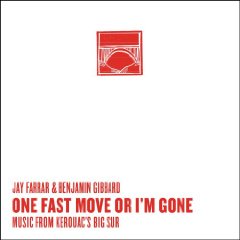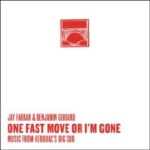
Atlantic Records
To me, making a film about anything Jack Kerouac-related is a risk. Trying to capture the man’s words on film – in effect, to tame their rhythm and cadence and get them to pose properly for the camera – would be more of a lesson in broken spirit than an example of fine filmmaking. Even a straight documentary about the man and his words might best be left alone; too many attempts to pay tribute to Kerouac just end up echoing more of the same grasping by fans and followers that confused and haunted him all those years ago.
One Fast Move or I’m Gone: Kerouac’s Big Sur may be the exception to the rule, however. Directed by Curt Worden and produced by Gloria Bailen and Jim Sampas, One Fast Move is a documentary that doesn’t attempt to bond or burrow. Done with love, respect, and understanding for who and what Kerouac was, One Fast Move focuses on his attempt in 1960 to retreat to Lawrence Ferlinghetti’s remote cabin in Big Sur on the California coast, his failure to find peace there, and the book that was fueled by that failure.
As great of a read as Jack Kerouac’s Big Sur is, there’s nothing fun about it. Even in the lightest of its moments (Kerouac’s poetry inspired by the ocean’s roar – or the near-poetry of his sober yearnings for simplicity, wedged here and there in the cracks between hangovers/shitfaced horrorshows/total paranoia-fueled nightmares), Big Sur is a brutal book. Brutally beautiful and brutally honest – but brutal nonetheless.
So what we are gathered here to talk about is the documentary’s soundtrack, the newly-released One Fast Move or I’m Gone: Music from Kerouac’s Big Sur, performed by Death Cab for Cutie leader Benjamin Gibbard and Son Volt frontman Jay Farrar. And here’s the problem: perhaps if Gibbard was the only voice on the One Fast Move soundtrack, I might feel differently, but that’s not the way it is. Once you hear Jay Farrar on the album’s second cut “Low Life Kingdom,” that’s it: this is a dirty job, folks – and Farrar has the pipes and the attitude for it.
As a singer/songwriter, Farrar has always had a style that let the words be what they needed to be to tell the story; rhyming schemes and syllable count take a backseat to emotion. Therefore, turning some of the original _Big Sur_’s text to lyrics for this project fits Farrar’s style, whereas it doesn’t feel as natural when Gibbard does the same … or maybe he’s just too nice of a guy. Even though the book rode the psychic rollercoaster from the childlike giddiness of sober promises to middle-of-the-night bottom-of-the-wine-bottle blackness, Farrar might’ve been the better voice of choice for the entire project. For instance, whereas Farrar’s “San Francisco” captures all the blackness of waking up hungover and spooked in the Mars Hotel (with acoustic guitar and sparse neck rack blues harp), Gibbard’s “These Roads Don’t Move” comes off like a lightweight “Ballad of Easy Rider.”
I don’t doubt for a minute that Gibbard had just as much of himself invested in the project as Farrar (and yes, I’ve read the press release about Gibbard holing up in that same Big Sur cabin during writing sessions for Death Cab for Cutie’s Narrow Stairs album). The fact remains, though: Jay Farrar is a natural dweller of this kind of territory.
With the right psychiatric help and some medication, Jack Kerouac might’ve been able to beat those demons that chased him out of Big Sur. Of course, he might never have written another word, either. Trying to pretty any of this story up is a mistake – musically included.
Ben Gibbard might make for the nicer dinner guest, but Jay Farrar has the head-full-of-snakes thing nailed.



No Comments comments associated with this post